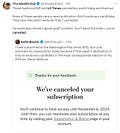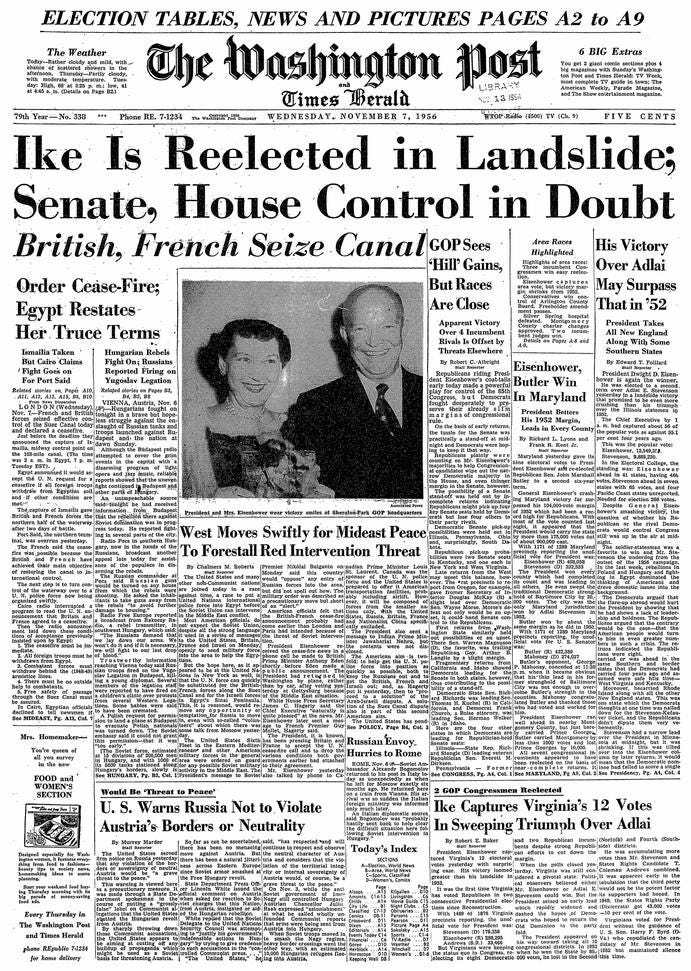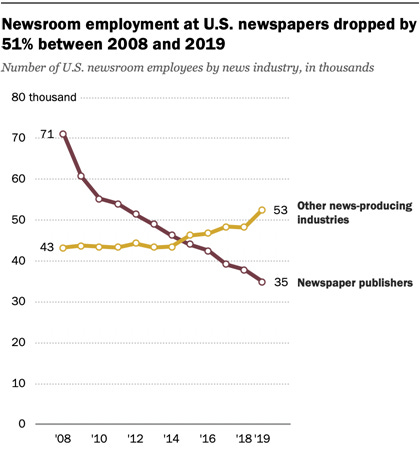A Good Weekend for Journalism
The news and editorial rooms at the Los Angeles Times and the Washington Post rebelled following their management's decision not to endorse Kamala Harris. Get a grip.
When was the last time that a newspaper editorial influenced your decision on how to vote?
That’s what I thought. Me neither.
But don’t tell the editorial departments (including newsrooms) of two of our nation’s largest newspapers, the Los Angeles Times and the Washington Post. They are in total meltdown, in full display on the social media site known as X. Triggered lefties are posting photos of their cancellation confirmations.
The Epoch Times reported why the LA Times’ owner and publisher, Patrick Soon-Shiong, chose not to endorse a candidate for President.
L.A. Times owner Patrick Soon-Shiong clarified in a post on X that the editorial board was asked to provide a factual analysis of Vice President Kamala Harris’s and former President Donald Trump’s positive and negative policies and their effects during their time in office.
“In addition, the Board was asked to provide their understanding of the policies and plans enunciated by the candidates during this campaign and its potential effect on the nation in the next four years. In this way, with this clear and non-partisan information side-by-side, our readers could decide who would be worthy of being President for the next four years,” Soon-Shiong wrote in an X post on Wednesday.
“Instead of adopting this path as suggested, the Editorial Board chose to remain silent and I accepted their decision.”
The editor of the Times’ editorial pages resigned in protest. Imagine being that arrogant and petulant. Good riddance. The publisher asked them to compare the candidates’ policy positions, but the editorial board refused. This, by the way, is supposed to be satire.
William Lewis, the relatively new President and Publisher of the Washington Post (reporting to the owner and Amazon founder Jeff Bezos), said this, relying heavily on the Post’s decision in 1960 not to endorse in that year’s contest between Vice President Richard Nixon and US Senator John F. Kennedy (D-MA):
We recognize that this will be read in a range of ways, including as a tacit endorsement of one candidate, or as a condemnation of another, or as an abdication of responsibility. That is inevitable. We don’t see it that way. We see it as consistent with the values The Post has always stood for and what we hope for in a leader: character and courage in service to the American ethic, veneration for the rule of law, and respect for human freedom in all its aspects. We also see it as a statement in support of our readers’ ability to make up their own minds on this, the most consequential of American decisions — whom to vote for as the next president.
Our job at The Washington Post is to provide through the newsroom nonpartisan news for all Americans, and thought-provoking, reported views from our opinion team to help our readers make up their own minds.
“. . .help our readers make up their own minds.” That’s how the media used to work, and it’s a fine strategy for newspapers like the Post and Times to regain lost credibility. Hopefully, newsroom resignations will allow Lewis, Bezos, and Soon-Shiong to replace them with real, clear-eyed journalists sharing that long-lost mission. The Post has consistently endorsed Democrats in every presidential race since 1960 except in 1988, when it chose not to endorse Democratic Gov. Michael Dukakis over Vice President George H. W. Bush.
The last Republican presidential candidate endorsed by the Washington Post was Dwight Eisenhower in 1956.
As a former newspaper reporter and editor in Oklahoma, I can tell you that newspaper endorsements used to matter when there were large numbers of undecided voters looking for insightful or respected commentary, especially on more obscure local races where candidates weren't known. Newspapers, back in the day, were local institutions, along with (but not necessarily equivalent to) churches, schools (teachers and Parent-Teachers Associations), local law enforcement, and the business community. Their opinions carried weight.
But when newspapers began their decline, went digital, and became cesspools of hyperbolic left-wing partisanship, voters tuned them out. Their owners, bleeding money and subscribers, are scrambling for new eyeballs, ad dollars, and relevancy. Kudos to Bezos and Soon-Shiong for their clear-eyed calls.
I remember one of the first editorials I wrote in the waning days of a Democratic primary in August, 1978 for state representative for the Henryetta Daily Free-Lance in Oklahoma. The paper’s general manager (I was the managing editor) decided. He chose to endorse Frank Shurden, a rancher whose family owned and operated a local funeral home. Frank was well-known and well-respected in the community, and my boss felt there was enough contrast in a close election with this opponent to make an endorsement. It was short, sweet, and boxed on the front page. Shurden won and later became a State Senator, retiring after 28 years of drama-free elective office in 2006.
Did our editorial make a difference? I don’t know. But I recall that it was short, constructive, and positive. We didn’t bash his opponent. It certainly didn’t hurt.
As with many other local newspapers, a stagnant local economy and population has converted that newspaper into a biweekly. At least they still publish, unlike newspapers in many other smaller communities.
I have no problem with newspapers choosing to endorse and don’t care who they settle on. An excellent editorial endorsement includes insights and rationality not evident elsewhere. Newsrooms are historically left-leaning, and publishers don’t often get in their way, but I will always tip my hat to a well-written, well-documented, and well-reasoned endorsement free of hyperbole, whether I agree with it or not. I haven’t seen one in years, relying instead on excellent commentary on Substack and elsewhere.
Political endorsements are something of a lost art. News organizations are better off not making them, but instead providing thoughtful, diverse views from a stable of writers.
This is a good weekend for journalism. Other failing newspapers should take note. I hope many of Post’s and Times’ deluded journalists quit and find honest work at places like Media Matters, Mother Jones, or The Nation, far left progressive outfits more compatible with their worldviews. Maybe the Open Society Foundation can help them with their resumes. I can’t wait for the Sunday morning news shows to scream, “How dare the Washington Post not tell us (you) how to vote!” The topic will dominate those shows, which have become increasingly irrelevant.
Why do people need newspapers or any media outlet to tell them how to vote? A good editorial department with smart, diverse views is more valuable than an endorsement, and yes, the Washington Post has one, including a stable of terrific center-right writers like Marc Thiessen, Ramesh Ponnuru, Henry Olsen, Hugh Hewitt, and others. Voters should be trusted to make their own judgments. Their lefty editorial writers don’t impress me, but they have their following and contribute to the public discourse in their own unique ways. I don’t subscribe to or read the Los Angeles Times so I can’t speak to theirs.
Let’s be real for a moment. The people upset that the Washington Post or LA Times didn’t endorse Kamala Harris - or more accurately, trashing Donald Trump as the Orange Hitler - are hyperventalating idiots, clueless on the safeguards of our the world’s most successful democratic republic. They’ve swallowed - hook, line, and sinker - the notion that one man can unravel the most successful constitution in world history, quash freedom of speech, and use troops to quell legitimate protest.
How stupid and uninformed. They should look in a mirror for the real threat to democracy - ignorance.
I’ve been criticized for keeping my Washington Post subscription, but despite some terrible journalism, I’m glad I did, if only for their editorial pages and this decision not to endorse. I’m happy to support journalism that I don’t agree with, so long as diverse voices are welcome and respected. So should you.
We are poorly served by shrinking and declining newspapers, replaced by increasingly censorious social media outlets like Facebook and Google, or none at all. It used to be our mission as journalists to relentlessly pursue truth and trust readers to respond and make their own judgments, incorporating editorials to convey things not suited for news reporting.
It would be healthy for the profession and the country to rediscover that mission.








Par for the course. Kagan resigns claiming Bezos stepped in to prevent a Harris endorsement to curry favor with Trump. One would presume an Editor-at-Large for a major national news outlet would rely on at least one journalistic news standard to substantiate his claim. An on-the-record source or two? A written document or e-mail? A recording? How about a call to Bezos or Trump seeking confirmation of the claim?
Crickets. Not a shred of evidence to substantiate his allegation. He's treated this "story" the same way the Post has unfortunately treated "news" gathering for years. Did Bezos can an endorsement of Harris to curry favor from Trump for Amazon or Blue Origin? I've not a clue. But I do know that before I publicly claimed he did, I'd first uncover enough facts to prove it to keep my journalistic integrity intact.
Not only do many people seek media sources that they already agree with, but apparently, they are demanding that these sources confirm their biases. Anything is better than thinking independently.